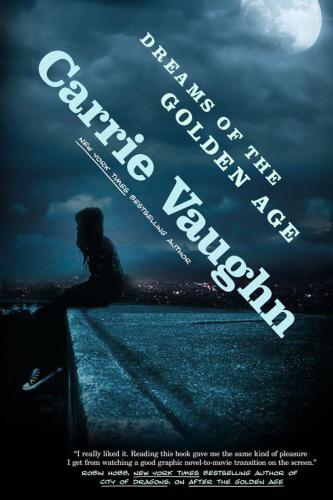
Dreams of the Golden Age
- اطلاعات
- نقد و بررسی
- دیدگاه کاربران
نقد و بررسی

November 15, 2013
Is covert manipulation a better parental and corporate tactic than overt pressure? Vaughn's superpowered sequel to After the Golden Age (2011) attempts to answer that. Celia West wasn't born with superhuman abilities like her parents were, but her dedication to her home, Commerce City, is no less fierce. She did inherit the family business, West Corp, and she works tirelessly to use her wealth to better the city, not merely to profit from it--to the dismay of her rivals. She also keeps a keen but surreptitious eye on all of the descendants of Commerce City's superhumans, waiting for them to show powers of their own and secretly encouraging their vigilantism when they do. Naturally, she's wondering if her teenage daughters by telepath Dr. Arthur Mentis, Anna and Bethy, will be among them. Meanwhile, Anna struggles with figuring out how her ability to psychically locate people fits in with the more battle-ready powers of her friends (all members of the vigilante team she's secretly formed) and concealing her activities from her parents. As in the previous volume, the superhero narrative is a framework to explore the different ways in which children establish their independence from their parents and the degree to which parents can actively support that endeavor--and to what extent parents can and should accept support from their children. The story also examines the considerable reach of financial and legal power and how one's good intentions when wielding those powers may not be enough to justify one's actions. Finally, it serves as a strong argument for open, honest communication--even, or perhaps especially--in a milieu of disguises and secrets. A worthy, rich and thoughtful sequel.
COPYRIGHT(2013) Kirkus Reviews, ALL RIGHTS RESERVED.

January 1, 2014
More known for her urban fantasies featuring Kitty Norville (Kitty in the Underworld), Vaughn returns to the characters she introduced in 2011's comic book-inspired After the Golden Age. That book focused on Celia West, the nonpowered daughter of the most famous hero of Commerce City, and a lot of its appeal was based on this concept of a "normal" person growing up in the shadow of the superpowered. This sequel shifts focus to the next generation, Celia's daughter, who has inherited a variation of her father's (Dr. Mentis) mental skills. Celia, never an easy character to love, uses surveillance and manipulation to try both to protect Anna and steer her toward what Celia sees as her destiny. But being a traditional teen, Anna rebels against her parents' expectations, exploring her abilities in secret. VERDICT The decision to age down this sequel to a younger protagonist makes this even more of a YA title than the first book, keeping the fast-paced adventure but with more teen angst and less of a cynical bite.
Copyright 2014 Library Journal, LLC Used with permission.

December 1, 2013
Sixteen-year-old Anna and her friends sneak out at night to meet up in the park and regularly catch the attention of the police in Commerce City, but they're not up to no good. They're practicing their superpowers and training to become a new team of vigilante superheroes. Meanwhile, Anna's mother, Celia, is trying to rescue the city through more conventional meansnamely, her wildly successful development company, currently bidding the city to start a major revitalization project. But when a shell company frivolously sues West Corp to derail their bid, Celia manages to slyly recruit her teenage daughter to investigate the organization with her team, and they discover a new archvillain, the Executive. In this follow-up to After the Golden Age (2011), Vaughan adds a liberal dose of family drama to tried-and-true superhero tropes. Celia's struggle to balance her life as a mother and a powerful executive is so at the fore that the superhero elements often seem merely incidental, but readers looking for an unusual spin on a mother-daughter dynamic will find a lot to like.(Reprinted with permission of Booklist, copyright 2013, American Library Association.)




دیدگاه کاربران